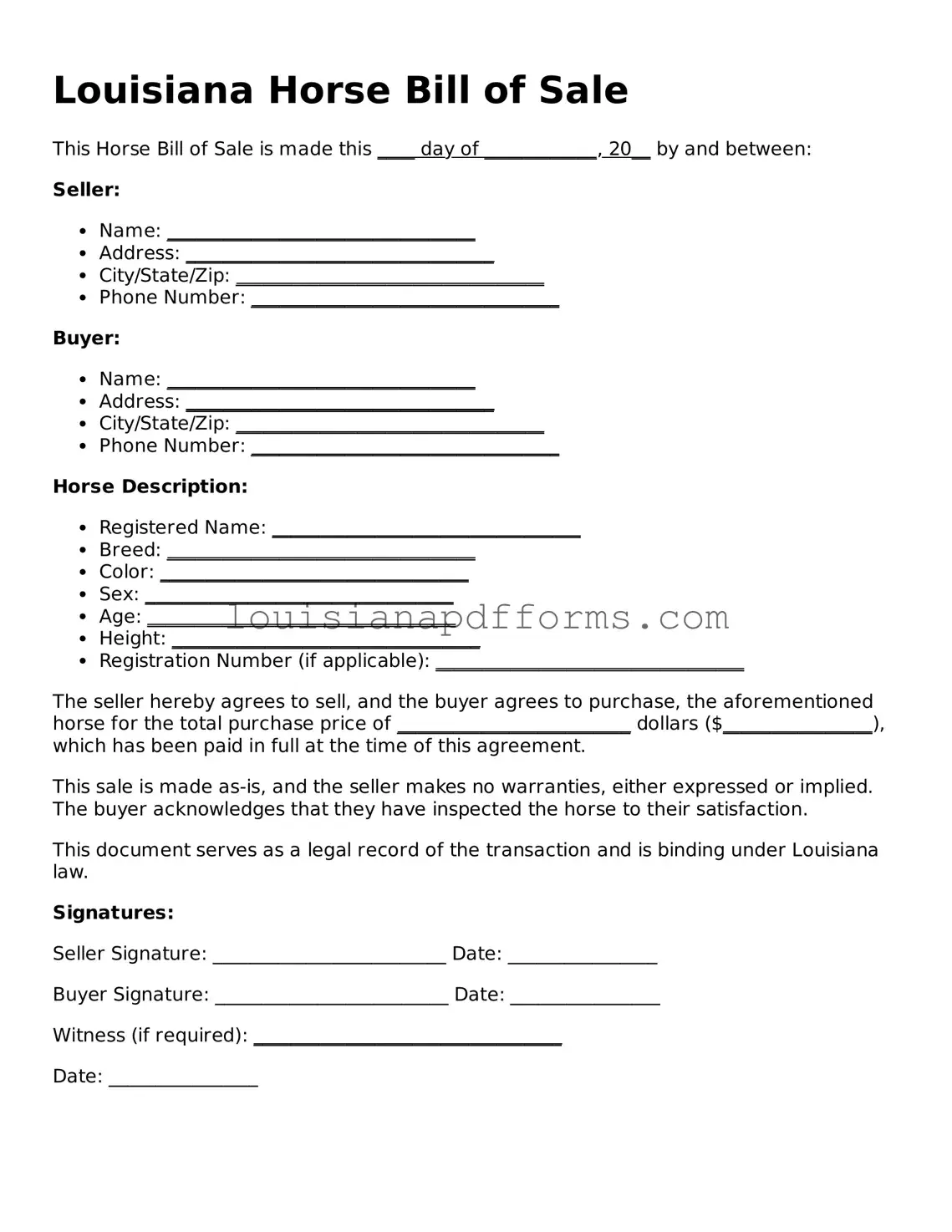What is a Horse Bill of Sale?
A Horse Bill of Sale is a legal document that serves as proof of the sale and transfer of ownership of a horse from one party to another. This document outlines the terms of the sale, including the purchase price and any warranties or guarantees regarding the horse's health and condition. It is essential for both the buyer and seller to have this document to protect their rights and interests.
Why is a Horse Bill of Sale important in Louisiana?
In Louisiana, a Horse Bill of Sale is important for several reasons:
-
It provides legal evidence of ownership transfer, which can be crucial in disputes.
-
It can help establish the terms of the sale, including any conditions or agreements made between the buyer and seller.
-
It may be required for registration or other legal purposes, such as insurance or veterinary care.
A comprehensive Horse Bill of Sale should include the following details:
-
The full names and addresses of both the buyer and seller.
-
A detailed description of the horse, including its breed, age, color, and any identifying marks.
-
The purchase price and payment method.
-
The date of the sale.
-
Any warranties or guarantees provided by the seller regarding the horse's health or condition.
-
Signatures of both parties to validate the agreement.
Is a Horse Bill of Sale required by law in Louisiana?
While a Horse Bill of Sale is not legally mandated in Louisiana, it is highly recommended. Without this document, proving ownership or the terms of the sale can become complicated. Having a written agreement protects both parties and helps to avoid potential misunderstandings or disputes down the line.
Can I create my own Horse Bill of Sale?
Yes, you can create your own Horse Bill of Sale. However, it is advisable to ensure that all necessary information is included and that the document meets any relevant legal standards. Templates are available online, but customizing the document to fit your specific transaction is often beneficial. Consulting with a legal professional can also provide peace of mind.
What if the horse has health issues?
If the horse has known health issues, it is crucial to disclose this information in the Horse Bill of Sale. The seller should include a statement regarding the horse's health condition and any treatments that have been administered. This transparency helps protect the seller from future liability and ensures the buyer is fully informed about the horse's health status.
Do I need to have the Horse Bill of Sale notarized?
Notarization is not a requirement for a Horse Bill of Sale in Louisiana, but it can add an extra layer of legitimacy to the document. Having the bill notarized can help verify the identities of both parties and the authenticity of their signatures, which may be beneficial in case of any disputes later on.
What happens if I lose the Horse Bill of Sale?
If you lose your Horse Bill of Sale, it is advisable to try to obtain a copy from the other party involved in the transaction. If that is not possible, you may need to create a new bill of sale that includes all the original details. Documenting the loss and any communications regarding the transaction can also be helpful for future reference.
Can a Horse Bill of Sale be used for other animals?
While a Horse Bill of Sale is specifically designed for the sale of horses, similar documents can be used for other animals. Each type of animal may have specific requirements or considerations, so it’s essential to tailor the document accordingly. For example, a bill of sale for livestock or pets may include different details based on the animal's needs and the transaction specifics.

